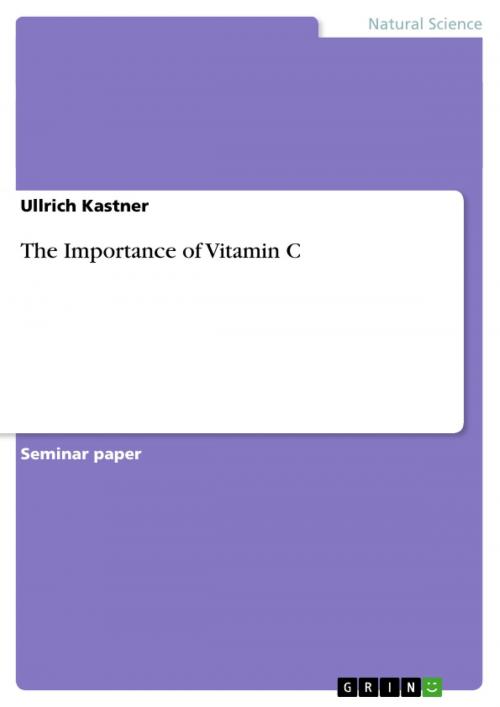| Author: | Ullrich Kastner | ISBN: | 9783638192958 |
| Publisher: | GRIN Publishing | Publication: | June 2, 2003 |
| Imprint: | GRIN Publishing | Language: | English |
| Author: | Ullrich Kastner |
| ISBN: | 9783638192958 |
| Publisher: | GRIN Publishing |
| Publication: | June 2, 2003 |
| Imprint: | GRIN Publishing |
| Language: | English |
Seminar paper from the year 2001 in the subject Chemistry - Food Chemistry, grade: A+ oder 95%, César Ritz Colleges (Chemical Institute), 8 entries in the bibliography, language: English, abstract: The discovery of ascorbic acid, better known as Vitamin C in1928 by the Hungarian Dr. Szent-Gyorgyi, a later Nobel Prize winner, was one of the biggest achievements in the biochemical area. It was without doubt a huge step for the improvement of the human health and well-being. With that discovery however a strong debate started around that important water-soluble vitamin. Another famous scientist, Dr. Linus Pauling proposed in 1970 that the daily intake of Vitamin C needs to be much higher than the officially recommended daily intake of 60mg per day. In his books, Pauling claims that mega doses of Vitamin C can treat the common cold efficiently. This arose a big controversy between scientists in the last years. But what is Vitamin C, what is its function in the human body, and can it really improve our health? Is it really a universal medicine or just another 'usual' vitamin? Certain is, that Vitamin C is a very important nutrient, which the human body has to obtain from outside sources; this is different to most animals, except guinea pigs, which can produce ascorbic acid in their livers from glucose. If we don't get enough Vitamin C, it can cause severe damage to our bodies. Therefore we must ensure, that we obtain enough of it from our diet.
Seminar paper from the year 2001 in the subject Chemistry - Food Chemistry, grade: A+ oder 95%, César Ritz Colleges (Chemical Institute), 8 entries in the bibliography, language: English, abstract: The discovery of ascorbic acid, better known as Vitamin C in1928 by the Hungarian Dr. Szent-Gyorgyi, a later Nobel Prize winner, was one of the biggest achievements in the biochemical area. It was without doubt a huge step for the improvement of the human health and well-being. With that discovery however a strong debate started around that important water-soluble vitamin. Another famous scientist, Dr. Linus Pauling proposed in 1970 that the daily intake of Vitamin C needs to be much higher than the officially recommended daily intake of 60mg per day. In his books, Pauling claims that mega doses of Vitamin C can treat the common cold efficiently. This arose a big controversy between scientists in the last years. But what is Vitamin C, what is its function in the human body, and can it really improve our health? Is it really a universal medicine or just another 'usual' vitamin? Certain is, that Vitamin C is a very important nutrient, which the human body has to obtain from outside sources; this is different to most animals, except guinea pigs, which can produce ascorbic acid in their livers from glucose. If we don't get enough Vitamin C, it can cause severe damage to our bodies. Therefore we must ensure, that we obtain enough of it from our diet.















